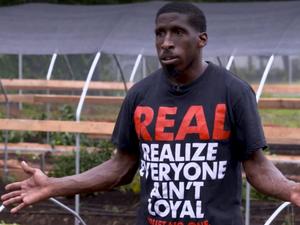With the global population growing, more food will need to be produced to feed it. However, with growth comes the loss of agricultural land, making it increasingly important to find ecological and sustainable practices.
A couple weeks ago, NTX Inno wrote about the exit from stealth of one of North Texas’ newest startups on the agri- and biotech scene -- Farm Shield. This week, we got a chance to catch up with its technical director Dave Coorts about how the Southlake-based startup is growing both its business and crops, as well as just what the hell supramolecular host chemistry means.
“I spent most of my professional career trying to kill things… be it weeds, bugs, bacterial pathogens, fungal pathogens. And as I’ve gone through my career, I’ve looked at things and I’ve become very effective at doing that, but I’m also looking at I’ve got kids and grandkids now and I’m looking at what kind of world do I want them to inherit,” Coorts told Inno.

Farm Shield’s technology originally grew out of an industry that many consider the antithesis of sustainability – oil and gas. Coorts and President John Appel were testing a chemical for the industry that they knew would likely help plants grow better. It worked. Really well. And now, the company is looking to commercialize that product in the crop protection manufacturing industry.
So what is it? As Coorts says, “we use a supramolecular host chemistry to try and develop products that are usable in numerous different aspects of agriculture to try to make the world a better place.” Makes sense, right?
Supramolecular chemistry looks at molecular structures that essentially have the ability to self-organize and assemble. Examples can be found within the human body in structures like DNA or in the outside world in things like the liposomes that make up the gel on the coating of a liquid capsule pill. For the crop protection industry, this means Farm Shield’s aqueous-based, proprietary biotechnology can be added into existing chemical formulations to make their active ingredients more effective.
“If we can make it more efficacious, where the grower, who is using that, can get better effects and not necessarily have to use it as often… for us, it’s about reducing the active ingredient load,” Coorts said. “That is really important in the fact that we can reduced the amount of active ingredient that is put into the environment, which is a major focus for us as far as increasing sustainability and decreasing the load on the environment, which I think we can all agree is a positive thing.”
Coorts said that most crop protection products are off patent, meaning many farmers are using products created decades ago. This causes issues as plants build resistances and profit margins for crops shrink.
By adding Farm Shield's supramolecular chemistry, manufacturers can cut R&D costs, which can make getting the product to farmers less cost prohibitive. It also allows makers to differentiate their formulations. On the farmer’s side, it helps cut cost and environmental impact by reducing the amount of chemical needed to treat crops.
“Things have evolved over the last 20 years, where the public really wants to see a more sustainable approach to agriculture, they want to know that the people who are producing their food are reducing their environmental impact that they have both on fauna as well as the food they’re going to eat,” Coorts said. "They want to make sure that it’s safe, that it’s healthy.”

Since last year, Farm Shield has been validating and trialing its product with researchers at Syntech Research and Michigan State University on herbicides and fungicides. However, that research was slowed as Farm Shield’s university partners closed labs and the company’s internal team took social distancing and safety measures while working through the pandemic. It also delayed the company's exit from stealth.
Announcing its official launch this month, Coorts said the company is looking to “walk before we run.” However, he notes some of the data they’ve received from trials show reductions in chemical uses between 50% and 80%. And as labs begin to slowly reopen, the six-person Farm Shield team has its eyes on different verticals, including the bio market.
Farm Shield is a portfolio company of BPS Agriculture, marking the second venture to emerge from the firm. In a press release, BPS teased a third entity is set to emerge from stealth later this summer. So far, BPS has been the source of Farm Shield’s funding.
“I joined this company directly with the goal of trying to produce products that will allow agriculture to continue to remain an important segment in this world, but it’s important that I’m going to leave an environment that is better than what it was than when I started,” Coorts said. “I think everyone that’s involved with the company is driven by those same kinds of things. It’s about how do we bring a technology that can functionally change the world and the way things are done.”








